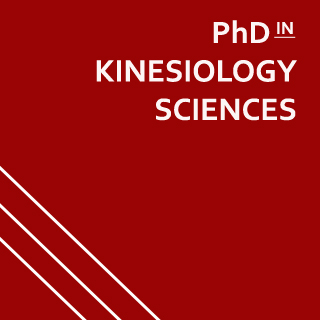
PhD opportunities are available in 5 areas of specialization:
- Biomechanics and Neuroscience
- Exercise Physiology
- Social Aspects of Sport, Health, & Physical Education
- Adapted Physical Activity
- Sport and Exercise Psychology
Biomechanics and Neuroscience
Biomechanics and Neuroscience researchers work to better understand human structure and function interactions between biology (muscles, bones, joints), mechanics (forces, acceleration, motion) and/or the nervous system (brain, nerves, genetics). We aim to improve our understanding of body movement in health and disease, within different population groups (e.g. men and women), across the lifespan (from young to old), and in a variety of settings (e.g. sport, workplace and rehabilitation). From this research approach, in turn, we can design and implement intervention strategies to augment health and well-being.
Our research experts in this group study, for example:
- Mobility in healthy, aging and in people with disabilities such as stroke and Parkinson’s disease from a brain and behavior perspective;
- The impact of training, fatigue and musculoskeletal disorders on posture, motion and function of athletes and workers;
- How ergonomic interventions such as standing desks affect neuromechanical and performance characteristics;
- Testing of novel sport equipment design and their impact on athletic performance in running and skating;
- How biomarkers can help detect functional impairments associated with juvenile diseases;
- The epigenetic modifications associated with brain and spinal cord postnatal development particularly affecting neuroplasticity.
Professors in Biomechanics and Neuroscience:
Exercise Physiology
Our Exercise Physiology faculty members are broadly interested in the effects of exercise and physical activity on functional, health and performance outcomes in healthy, clinical, and athletic populations.
Specific areas of interest include: muscle, cardiovascular and respiratory (patho)physiology; nutrition and exercise metabolism; musculoskeletal health; body composition; aging; prevention and management of chronic disease; and rehabilitative exercise training, including prehabilitation.
Our research methods span from basic to clinical, including: clinical cardiopulmonary exercise testing with pulmonary gas exchange and metabolic analyses; respiratory and limb muscle force assessment; electromyography; dual-energy x-ray absorptiometry; magnetic resonance imaging and spectroscopy; ultrasound and near infrared spectroscopy; microneurography; stable isotope tracers; biochemical and molecular analyses of cardiovascular, pulmonary, metabolic, muscle and bone responses to exercise and training.
Professors in Exercise Physiology:
Social Aspects of Sport, Health, & Physical Education
Research in this area explores the practice and provision of sport and physical activity in diverse community contexts, including schools. We are mostly concerned with how sport, physical activity, and physical education can help to foster (or strain) the health and wellbeing of young people. We are also concerned with identifying social and historical patterns of discrimination as they relate to peoples’ engagement in sport and physical activity.
Potential research topics in this area include youth sport; physical activity patterns among youth and adolescents; Indigenous sport and physical culture.
Professors in Social Aspects of Sport, Health, & Physical Education:
Adapted Physical Activity
Adapted physical activity is a branch of kinesiology sciences that focuses on an interdisciplinary understanding and the promotion of physical activity participation among people with disabilities.
This graduate program stream touches upon physical activity and sport participation of people living with one or multiple disabilities, including developmental, emotional, intellectual, and/or physical. Research within the adapted physical activity steam is primarily applied to real world physical activity and sport settings and is founded on theoretical approaches. Studies will center on motivation, self-determination, coaching, participation, and/or social inclusion of children, youth, or adults with disabilities within sport/physical activity contexts.
Professors in Adapted Physical Activity:
Sport and Exercise Psychology
Sport and Exercise Psychology involves the scientific study of people and their behaviours in sport and exercise contexts and the practical applications of that knowledge. Sport and Exercise Psychology is an interdisciplinary field that is acknowledged as a core discipline within Kinesiology and Physical Education programs.
Most people study sport and exercise psychology with two objectives in mind: (1) to understand how psychological and social factors influence an individual’s behavioural outcomes (e.g., sport performance, exercise motivation) and (2) to understand how participation in sport and exercise influences psychological and social development, health, and well-being.
Sport Psychology Emphasis focuses on coaching psychology, youth involvement and development, sport-specific personality, motivation, arousal, anxiety, stress, aggression, group cohesion, psychological skills, and gender issues.
Exercise Psychology Emphasis focuses on exercise and physical activity issues associated with epidemiology, barriers and motives, social influences and social support, community, group, and individual interventions, self-esteem, body image, stress and coping, emotional well-being, quality of life, and special populations.
At McGill our sport and exercise psychology program focuses on a broad population base, including: elite or recreational athletes, youth and older adults, and people with disabilities and chronic diseases.
Professors in Sport and Exercise Psychology:
Professors Accepting Graduate Students
| Professors |
Fall 2026 |
Winter 2027 |
|---|---|---|
| Dr. Gordon Bloom | Masters and PhD | N/A |
| Dr. Tyler Churchward-Venne | Masters and PhD | N/A |
| Dr. Bruno DaCosta | Masters and PhD | Masters and PhD |
| Dr. Philippe Dixon | Masters and PhD | Masters and PhD |
| Dr. Lindsay Duncan | Masters and PhD | N/A |
| Dr. Benoit Gentil | Masters and PhD | N/A |
| Dr. Jenna Gibbs | Masters and PhD | Masters and PhD |
| Dr. William James Harvey | Masters and PhD | N/A |
| Dr. Dennis Jensen | Masters and PhD | - |
| Dr. Jordan Koch | Masters and PhD | PhD |
| Dr. Caroline Paquette | Masters and PhD | - |
| Dr. Shawn Robbins | Masters and PhD | N/A |
| Dr. Celena Scheede-Bergdahl | - | - |
| Dr. Shane Sweet | Masters and PhD | - |
| Dr. Charlotte Usselman | Masters and PhD | Masters and PhD |

